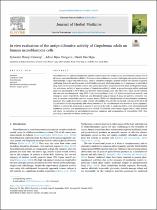| dc.contributor.author | Ekpo, Okobi Eko | |
| dc.contributor.author | Enogieru, Adaze Bijou | |
| dc.contributor.author | Omoruyi, Sylvester Ifeanyi | |
| dc.date.accessioned | 2022-07-18T13:28:37Z | |
| dc.date.available | 2022-07-18T13:28:37Z | |
| dc.date.issued | 2021 | |
| dc.identifier.citation | Omoruyi, S. I., Enogieru, A. B., & Ekpo, O. E. (2021). In vitro evaluation of the antiproliferative activity of Carpobrotus edulis on human neuroblastoma cells. Journal of Herbal Medicine, 30, 100519–. https://doi.org/10.1016/j.hermed.2021.100519 | en_US |
| dc.identifier.uri | https://doi.org/10.1016/j.hermed.2021.100519 | |
| dc.identifier.uri | http://hdl.handle.net/10566/7602 | |
| dc.description.abstract | Neuroblastoma is a solid neuroendocrine tumour located outside the cranial cavity and contributes about 15% of
all cancer‚ÄĎassociated deaths in children. Treatment of neuroblastoma is quite challenging and involves the use of
chemotherapy, surgery and radiotherapy. Despite treatment strategies, systemic toxicity are setbacks to patient
well-being, hence the need for a new and affordable approach. Medicinal plants are of importance in the field of
drug discovery for cancer as some notable anti-cancer agents have been isolated from them. In the present study,
the anti-cancer activity of aqueous extract of Carpobrotus edulis (C. edulis), a ground-creeping edible medicinal
plant was investigated in SK-N-BE(2) and SH-SY5Y neuroblastoma cells. The effect of C. edulis on cell viability
and survival was determined using MTT (3-[4,5-dimethylthiazol-2-yl] 2,5 diphenyltetrazolium bromide) and
clonogenic assays respectively. Apoptosis was determined using a Caspase-9 assay kit and flow cytometry was
used to measure intracellular reactive oxygen species (ROS) and depolarization of mitochondrial membrane
potential. The results show that C. edulis inhibits cell viability (IC50 of 0.86 mg/ml and 1.45 mg/ml for SK-N-BE
(2) and SHSY5Y cells respectively) and colony formation in the neuroblastoma cells as well as induce apoptosis,
which is evidenced by an increase in caspase-9 activity in the cells. C. edulis also led to a loss of mitochondrial
membrane potential and increased production of ROS. Collectively, these results suggest that C. edulis induces
cell death via induction of mitochondrial-mediated apoptosis and accumulation of intracellular ROS, thus
providing a rationale for further investigations. | en_US |
| dc.language.iso | en | en_US |
| dc.publisher | Elsivier | en_US |
| dc.subject | Reactive oxygen species | en_US |
| dc.subject | Mitochondrial membrane potential | en_US |
| dc.subject | Apoptosis | en_US |
| dc.subject | Neuroblastoma | en_US |
| dc.subject | Carpobrotus edulis | en_US |
| dc.title | In vitro evaluation of the antiproliferative activity of Carpobrotus edulis on human neuroblastoma cells | en_US |
| dc.type | Article | en_US |

